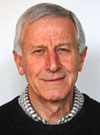System Upgrade on Tue, May 28th, 2024 at 2am (EDT)
Existing users will be able to log into the site and access content. However, E-commerce and registration of new users may not be available for up to 12 hours.For online purchase, please visit us again. Contact us at customercare@wspc.com for any enquiries.

Tony Seed, Gilbert Thompson, Jackie Downs and John MacDermot at the book's launch in London
This book brings together in one volume fifteen Nobel Prize-winning discoveries that have had the greatest impact upon medical science and the practice of medicine during the 20th century and up to the present time. Its overall aim is to enlighten, entertain and stimulate. This is especially so for those who are involved in or contemplating a career in medical research.
Anyone interested in the particulars of a specific award or Laureate can obtain detailed information on the topic by accessing the Nobel Foundation's website. In contrast, this book aims to provide a less formal and more personal view of the science and scientists involved, by having prominent academics write a chapter each about a Nobel Prize-winning discovery in their own areas of interest and expertise.
Sample Chapter(s)
Foreword (34 KB)
Chapter 1: The Discovery of Insulin (2,401 KB)
Contents:
- The Discovery of Insulin (Robert Tattersall)
- The Discovery of the Cure for Pernicious Anaemia, Vitamin B12 (A Victor Hoffbrand)
- The Discovery of Penicillin (Eric Sidebottom)
- The Introduction of Cardiac Catheterization (Tony Seed)
- The Discovery of the Structure of DNA (James Scott and Gilbert Thompson)
- The Interpretation of the Genetic Code (John MacDermot and Ellis Kempner)
- The Discovery of Neuropeptides and Radioimmunoassay of Peptide Hormones (Jaimini Cegla and Stephen Bloom)
- The Development of Computer-Assisted Tomography (Adrian M K Thomas)
- The Discovery of Prostaglandins (Rod Flower)
- The Antibody Problem and the Generation of Monoclonal Antibodies (Herman Waldmann and Celia P Milstein)
- The Discovery of the LDL Receptor and Its Role in Cholesterol Metabolism (Gilbert Thompson)
- The Invention of the Polymerase Chain Reaction and Use of Site-Directed Mutagenesis (Anne K Soutar)
- The Discovery of the Pathophysiological Role of Nitric Oxide in Blood Vessels (Keith M Channon)
- The Discovery of Helicobacter pylori (Chris Hawkey)
- The Discovery of RNA Interference — Gene Silencing by Double-Stranded RNA (Richard P Hull and Timothy J Aitman)
Readership: Students, undergraduates, graduates, professionals and members of the general public interested in the impact of Nobel Prize-winning discoveries in medicine.


























